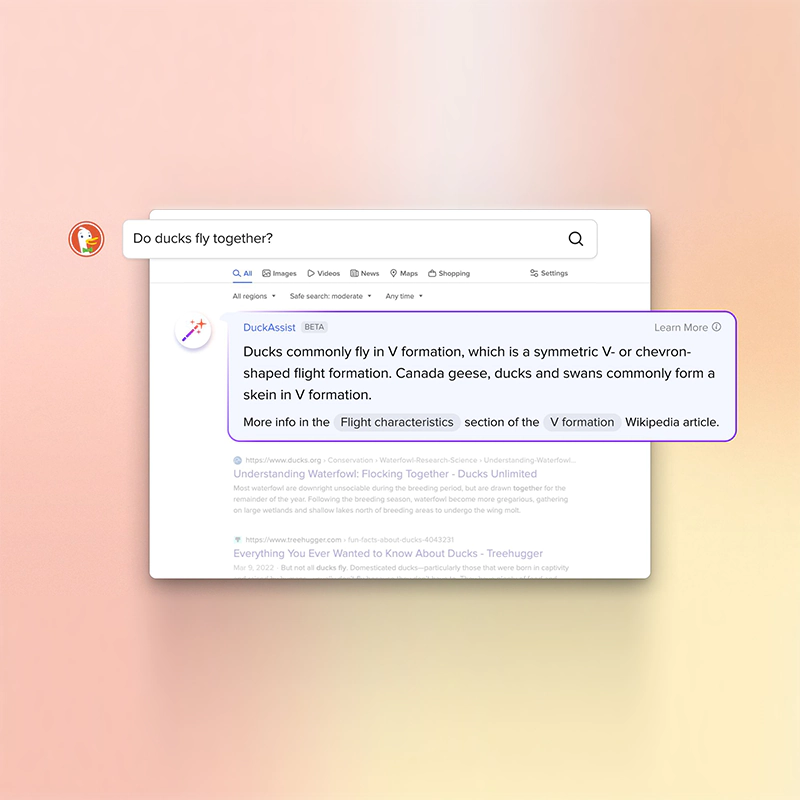
Privacy-focused search engine DuckDuckGo finally jumps into the bandwagon.
Following the introduction of OpenAI's ChatGPT, the tech world seemingly scrambled for their own solutions. Some opt to partner with OpenAI in order to make use of the popular chatbot, whereas others opt for creating their own.
DuckDuckGo, the privacy-focused search engine, chooses the former.
The company announced a feature called 'DuckAssist', which is an AI powered by ChatGPT.
But unlike ChatGPT, the talkative chatbot, DuckAssist isn't actually a chatbot.
Instead, it's an addition to the search engine's existing Instant Answers feature.
DuckDuckGo's Instant Answers is how the search engine taps into various online sources to give users a quick answer to their query, without requiring users to click any of the links in the search results.
With DuckAssist, the search engine can pull information form a smaller set of sources.
For instance, users querying questions into DuckDuckGo search bar, can have the DuckAssist AI scan Wikipedia articles, and occasionally Britannica, to generate an answer.
What DuckDuckGo is doing here, is making use of the technology behind ChatGPT to summarize the answer and make the response more conversational.
When DuckAssist answers, it also links to the whatever article it pulled its answer from.
Initially, according to a blog post by DuckDuckGo founder and CEO, Gabriel Weinberg, the best way to use DuckAssist is by asking questions with straightforward answers.
DuckAssist isn't launched every time Instant Answers showed up.
But according to Weinberg, wording a query in the form of a question should make it more likely that DuckAssist will generate a response.
Or, to make sure that DuckAssist is answering, users can ask a question by adding "wiki" in it.
This makes it more likely that DuckAssist will appear.
While DuckAssist is meant to make the search engine a lot more powerful, DuckAssist is just like any other ChatGPT-powered tool, or other chatbot AI.
What this means, DuckAssist won't always generate the correct answer, according to Weinberg.
The tool might struggle to correctly answer complex questions, too.
"There's a limit to the amount of information the feature can summarize," explained Weinberg. "Inaccuracies can happen if our relevancy function is off, unintentionally omitting key sentences, or if there's an underlying error in the source material given."
Generative AI is designed to generate response to any prompt, regardless of whether it "knows." To prevent DuckAssist from "hallucinating" answers, DuckDuckGo designed it to only summarize information from Wikipedia and related sources.
And in order to stay true to its roots, DuckDuckGo said that DuckAssist is anonymous, meaning thatit doesn't use queries to train its AI model, and that it doesn't share personally identifiable information with third parties.
For those who wish to not use DuckAssist, they can do so by disabling it in the search settings.
It's worth noting though, that disabling DuckAssist will also disable all Instant Answers, too.
Initially, DuckAssist is made available to DuckDuckGo's browsing apps and browser extensions, and not the web.
With DuckAssist, DuckDuckGo joins other tech companies, like Google and Microsoft, that have introduced their own AI tools to the public.
Google has what it calls Bard, which was a botched when it was demonstrated. The AI isn't powered by ChatGPT, and instead, it uses Google LaMDA.
Microsoft on the other hand, has what it calls the Bing AI chatbot, which is powered by ChatGPT. But because it's paired with Microsoft's own technology, which apparently made it more 'creative' and talkative. It was an issue before Microsoft fixed it.
A similar attempt was also made by Opera, which has launched a ChatGPT-powered tool capable of summarizing web pages.
According to OpenAI's CEO Sam Altman, users should be careful with this emerging technology.
"ChatGPT is incredibly limited, but good enough at some things to create a misleading impression of greatness," Altman said.
"It's a mistake to be relying on it for anything important right now. It's a preview of progress; we have lots of work to do on robustness and truthfulness."
Further reading: Transitioning To AGI Is Perhaps The Most Important, And 'Scary' Project In Human History
